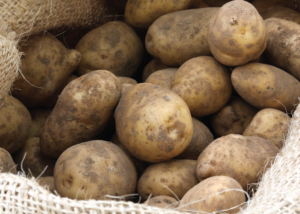Jun 25, 2024New partnership to bolster true seed commercialization in Kenya, India
A new agreement between global biotechnology company Bayer and Dutch seed company Solynta will facilitate the commercialization and distribution of true potato seeds in Kenyan and Indian markets.
The collaboration aims to develop new potato varieties from true seeds instead of seed tubers, according to a news release. Growers need 25 grams of disease-free true potato seeds per hectare to start a crop, compared to the 2,500 kilograms of perishable seed tubers required, according to the release.
Bayer’s distribution channels will help Solynta continue to achieve its goals of commercial variety introduction, announced last September. The new hybrid varieties will be distributed in the form of true seeds by Bayer to potato growers in the most remote areas of Kenya and India, according to the release.

True seed benefits
True potato seeds, or seeds from potato fruits, are less likely to carry disease or spoil in transit than seed tubers and are easier to transport and store, according to the release. True potato seeds also have a long shelf life and are available year-round.
Through hybrid breeding, true potato seeds can be bred with additional beneficial traits, including disease resistances and climate resilience.
“We are excited to enter the collaboration with Solynta and to further support smallholder farmers,” Frank Terhorst, head of Strategy & Sustainability at Bayer’s Crop Science Division, said in the release. “Seed innovation is one of our key focus areas. We expect these true potato seeds to have a positive impact on local communities and on food and nutritional security in Kenya and India.”
Solynta CEO Peter Poortinga said the true potato seeds are the result of almost two decades of work on hybrid potato breeding technology.
“Hybrid breeding is a proven technology in many existing food crops, which allows fast development of new varieties with desirable traits, such as disease resistances,” he said. “As a company, we are delighted to join forces with Bayer on the introduction and distribution of our true potato seeds to these markets. This collaboration is a major step towards widespread commercial introduction of true potato seeds and the establishment of new, sustainable potato cropping systems.”
Joost van Regteren, Solynta chief commercial officer, said the partnership signals the beginning of the company’s expanded commercial presence in the regions.
“We are focused on rapidly and broadly introducing true potato seeds, conducting field and commercial trials to demonstrate their effectiveness,” he said.
Growing challenges
Both regions face challenges including the lack of high-quality starting material with suitable genetics, according to the release.
In Kenya, potato is the No. 2 staple crop, and its growers are dependent on a limited supply of seed tubers which often carry potato diseases.
India is the second-largest potato market in the world. Its fast-growing population and variety of climate zones create demand for robust, disease-resistance varieties that are easy to transport.
“The addition of true potato seeds to our portfolio is a natural progression of the work our team continues to do to support smallholder growers and offer the latest innovations,” Inci Dannenberg, president of Global Vegetable Seeds at Bayer, said in the release. “We will utilize our already well-established distribution networks in India and Kenya to get true potato seeds into the hands of growers.”














